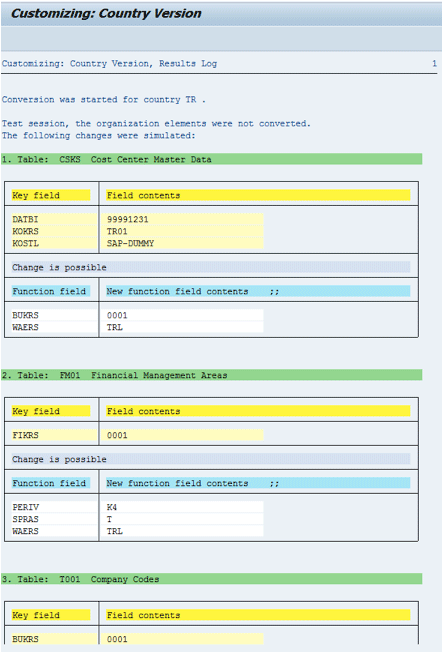Learn two approaches for installation of a country version in an SAP system to meet country-specific legal requirements.
Key Concept
A country version contains country-specific functions supplied as part of a standard SAP system. Each country version consists of generic SAP system functions, country-specific functions, and a country template. These do not constitute separate application components, but are contained in various SAP system application components. A country template contains a range of customizing settings that are typical for a particular country. The country template is applied to the sample organizational units in an SAP system when a country version is installed.
Finding the right solutions and deciding on the right approach in your SAP system to meet country-specific legal requirements have always been big challenges for most companies. Three key reasons for this are:
-
Frequently changing and complex legal requirements in some countries, such as Brazil and India
-
Lack of adequate knowledge of the available SAP tools and forums for finding the right solutions to meet these legal requirements
-
Strict and tight timelines to meet the legal requirements along with monetary and nonmonetary penal provisions
SAP provides standard country versions that contain specific functions to meet business and legal requirements. Each country version also contains a country template that can be used to set up organizational units of that country. The country template contains a range of customizing settings that are typical for a particular country.
Consider this example. Go to SPRO >Enterprise Structure > Localize Sample Organizational units or execute transaction code O035. Choose the object in the screen (not shown) as Country version. Select country TR (Turkey) as an example and execute the program in test run. The output of this program is shown in Figure 1. The output shows the settings that the country template of Turkey contains are applied to the sample organizational units. Some of the key customizing settings (i.e., tables that are applied with the country template) include company code, cost center, master data, chart of accounts, financial statement, versions, credit control areas, plant, and valuation areas.

Figure 1
Country template Turkey applied to sample organizational units
I explain two possible approaches for implementing the country versions in the SAP system and their comparative analysis. The first approach involves using the SAP Best Practices baseline package localized for the relevant country. The second approach involves applying the country version using the standard country installation program.
Option 1: SAP Best Practices Baseline Package Installation with Localized Country Versions
SAP provides a Best Practices baseline package with complete preconfiguration settings for generic, core business scenarios that support the most important business needs. The baseline package is available in more than 50 localized country versions and is developed in accordance with legal requirements and country-specific needs of the target country.
To explain this approach, I use a step-by-step example of how the Best Practices baseline package installation for Brazil can be used to meet a Brazil-specific legal requirement. The SAP Best Practices baseline package localized for Brazil contains preconfigured business scenarios to meet Brazil legal requirements. One of the key legal requirements in the area of taxes includes configuring the scenarios for Brazil taxes such as ICMS, ICMS with exceptions, IPI, IPI with exceptions, Substituição Tributária, Substituição Tributária with exceptions, and DIFAL. To install the SAP Best Practices package for Brazil and ensure compliance with this regulation, follow these steps:
Step 1. Check the SAP Note for the relevant SAP ERP Central Component (ECC) version of your system and SAP Best Practices version for Brazil. The latest Note available is 1896605 available for SAP ECC 6.0 enhancement package 7.0. Similarly, there are separate SAP Notes applicable for lower enhancement packages. The SAP Note contains the Quick Guide, manual steps, and other key files.
Step 2. Ensure that the technical prerequisites for installation are met at both the release and support levels. These prerequisites are described in the Quick Guide (attached to the SAP Note). They enable you to import the technical content into the system once your SAP applications are installed. All SAP Best Practices deliveries are tested at specific release levels of the application, which guarantees a smooth activation process.
Step 3. Download the SAP Best Practices baseline package V1-3.607 from the SAP Software Distribution Center on the SAP Service Marketplace (https://service.sap.com/swdc). It contains the country version for Brazil. SAP Best Practices packages are provided free to SAP customers and partners. However, a valid S-User ID is required for downloading SAP Best Practices. The SAP Best Practices package consists of a documentation package and a configuration DVD. The package contains detailed documentation on basic end-to-end business scenarios, additional information, and technical documentation. The configuration DVD contains all necessary elements (e.g., extended Computer Aided Test Tool [eCATT] procedures and business configuration sets) that are needed for the installation of SAP Best Practices.
Note
You need an S-User ID to access the SAP Service Marketplace and all related portals. To obtain this S-User ID, you need to register on the SAP Service Marketplace entry page (https://service.sap.com). For more information about obtaining an S-User ID, see SAP Note 1037574.
Step 4. Download the installation data files from the Implementation Content Files area for the country Brazil and specific ECC release. The zip file available for the latest version of ECC 6.0 for Brazil is named INST FILES BR pre BP ERP617V2.zip. These files contain the configuration data. Download the related solution file from the Implementation Content Files area for country Brazil and specific ECC release. The zip file available for the latest version of ECC 6.0 for Brazil is named SOL BL ERP607 BRV2 BP ERP617V2.zip.
Step 5. Upload the solution file and installation files downloaded above into the SAP system using solution builder provided with the SAP Best practices package. This results in automated activation and deployment of preconfigured business scenarios, including the ones for Brazil-specific taxes such as ICMS, ICMS with exceptions, IPI, IPI with exceptions, Substituição Tributária, Substituição Tributária with exceptions, and DIFAL. You can conduct a scoping exercise for detailed selection of business processes from the preconfigured ones based on the ones applicable to your business. The scenarios can then be adapted or modified manually to meet the taxation requirements of your business.
SAP provides a quick guide for implementing the baseline package for a country with the preconfigured scenarios to meet country-specific legal requirements. This quick guide is contained in country-specific SAP Notes released for the relevant SAP Support Package and baseline package version. The SAP Note for specific country and Best Practices version contains the latest version of the quick guide, solution file, and resolution for known issues. The quick guide primarily contains the information regarding system release and components required, recommended Support Package level, SAP Notes to be applied, and manual activities for implementing the country-specific best practices baseline package.
Key Links and SAP Notes
Here are some links to reference material for using the SAP Best Practices baseline package:
- https://service.sap.com/bestpractices. Go to Baseline Packages and then choose the relevant country for documentation on country-specific baseline packages. The documentation also includes the relevant SAP Note that contains the quick guide for implementation for the relevant country. It also contains documentation on how to download the SAP Best Practices.
- https://service.sap.com/swdc. Go to Installation and Upgrades > Browse our download catalog > SAP Best practices > SAP BP Baseline packages. Choose the relevant best practices version and download the documentation and configuration files.
- SAP Note 1225909. How to apply SAP Best Practices
Option 2: SAP Country Version Setup Using the Country Installation Program
Country installation program RSCICO02 or transaction code O035 can be used to accelerate the setup of country versions in a new system. However, unlike the Best Practices baseline package, this program does not perform a complete country setup. The country installation program can be seen as initialization of the new country by setting up the country-specific organizational units with automatic configuration of selected configuration settings, but it does not implement a new country.
The country installation program RSCICO02 configures the country-specific organizational units such as the company code and the sales organization for a given country and assigns country-specific settings to them. After the program has been completed, additional activities and specific implementation work have to be carried out. The country installation program should never be run directly in the production system. It should be executed in the development system and transported using Business Configuration Sets (BC Sets) to the quality and production systems.
Steps for loading the country version are as follows:
- The standard customizing settings required for the country versions are supplied in client 000. Company code 0001 contains all of the standard customizing settings as per the chart of accounts INT. Ensure that the standard customizing settings are not changed in the development client or company code 0001 in which the country version is to be installed.
- In company code 0001 of your development client, start the country installation program through transaction O035 and install the standard country version that you want. If the system prompts you to enter the chart of accounts, do so.
Using the entity copy functions available after you execute transaction code EC01 or follow menu path SPRO > Enterprise Structure > Definition > Financial Accounting > Edit, Copy, Delete, Check Company Code, copy the new customizing settings into a new company code of your choice. Check that the copied organizational units and their dependent objects are complete. Make any manual adjustments required. Copying the organizational units into a different company code means that company code 0001 remains available for other country installations.
Note
If you execute the program in test mode, the ECC system does not make any changes to the database, but issues a log of all the changes that the system would normally have made. It does not make any changes unless you execute it in update mode.
If the program is executed again for another country version, company code 0001 is overwritten with the settings of the new country.
Key Links and SAP Notes
Here are some links to reference material for using the country installation program RSCICO02 or transaction code O035:
- SAP Note 81892: Implementing a new country version
- SAP Note 63805:FAQ- Country Specific Customizing Settings
- SAP Note 641257: FAQ: Country Install Program (O035, RSCICO02)
Both the approaches have their pros and cons. The best practice approach takes the latest Support Package level into consideration and reduces dependence on new SAP Notes application. However, there are a lot of prerequisites in terms of minimum support pack and SAP Notes to be implemented in this approach that are more time-consuming. The country installation program approach is quicker and faster to implement because it does not have many prerequisites in terms of Support Package level and SAP Notes. However, this approach would have higher dependence on new SAP Notes applications at a later point in time.
The best practices approach has end-to-end country-specific scenarios preconfigured that can be used as a reference for new customizing. Also, these scenarios are pretested by SAP in a specific system landscape. This reduces the effort during the realization phase. The realization phase involves implementing all the business processes and technical requirements defined during the previous phases and documented in the business blueprint. During this phase, the IT experts validate and update configuration and demonstrate processes while the business users update the work instructions (business process procedures: BPP) and performs unit and integration tests. Because the country-specific scenarios are preconfigured and pretested by SAP in a Best Practices package, effort to build or configure them and also test them and resolve bugs is significantly reduced.
On the other hand, the country installation program does not preconfigure end-to-end scenarios. It just creates the various customizing objects, nodes, tables, and programs. Only basic customizing of FI, materials management (MM), and sales and distribution (SD) is added. Manual effort to investigate missing customizing is required. Also, these customizing settings are not pretested by SAP in any system landscape. The various scenarios would need to be manually configured or customized. This results in higher effort during the realization phase.
Tools and Forums Available to Meet Country-Specific Localization Requirements in an SAP System
Here is a list of some of the SAP and non-SAP tools and forums that you can use to find the right information solutions or decide on the right approach to meet some of the legal requirements and key legal changes introduced in many countries.
help.sap.com. The first source to look for finding the relevant information on a country-specific solution should be the documentation on the SAP help portal. On the help portal go to SAP ERP > SAP ERP Cross-Application Functions > Cross-Application Components > Country Versions. It contains documentation on the country-specific functionalities of more than 40 standard country versions that SAP offers.
SAP Notes. The next source to search for SAP solutions for country-specific legal enactments or requirements are the SAP Notes on the help and support portal on
https://service.sap.com/notes. To search for the relevant SAP Notes for the required country, choose the Application area as XX-CSC-** (country-specific developments), where ** represent the abbreviation for the relevant country (e.g., AR for Argentina, BR for Brazil, CH for Switzerland). Ensure that you check the SAP Note with the latest released date for the country-specific legal requirement.
SAP service marketplace country version documentation.
The information on the country versions can also be accessed at https://service.sap.com/local. Select the region and then the relevant country. This Web page provides information on country-specific new developments, legal changes, continuous improvements, support package deliveries, and documentations.
SAP mailbox and globalization knowledgebase.
The Globalization Services Unit at SAP enables customers and SAP to expand their businesses worldwide by addressing country-specific legal and language requirements of SAP solutions across the entire portfolio. Go to https://service.sap.com/globalization to access the SAP Globalization Services-related information. These services enable you to run all country versions simultaneously in the same system and also allow users to log on in one of the 40 languages supported. Two offerings of the Globalization Services are free and easy to get guidance on country-specific legal requirements. These are the mailbox and globalization knowledgebase. The mailbox can be accessed by sending email to globalization@sap.com on any questions related to globalization issues. The service is available 365 days a year and response time is less than a week. The globalization knowledgebase can be accessed at https://service.sap.com/gkb
(authorization is required). The tool provides important country-specific functionality provided in a consolidated way for 55 country versions of SAP ERP 6.0. You can select countries or regions and download the information in Excel format. The tool provides general information such as:
- Country information, including the country version’s complexity ranking and type of solution
- Language information, including code-page check and translation requirements
- SAP services, including shipment, documentation level, translation level, and SAP user groups
- Country legislation, including an estimation of the frequency of legal changes and interpretation
- Customer-specific environment, including customer developments and company-internal know-how
In addition, the globalization knowledgebase includes detailed information on country-specific functions, such as country-specific master data (e.g., country-specific transaction data, statutory reporting, statutory forms, and tax and payment information). Refer to SAP Note 1375438 (Globalization Collection Note) for more details on SAP Globalization Services.
Legal changes report.
The legal changes report can be accessed and downloaded at https://service.sap.com/legalchanges. It provides country-specific information on the following topics:
- A short description of the planned legal change
- The Legal Change Notes already released
- Link to the corresponding SAP note with detailed information
- The planned delivery date of upcoming legal change notes
You can also access legal changes of the past and relevant notes in the legal change report archives on this Web page.
SAP Users Group. There are many users groups (e.g., ASUG in United States) created worldwide by SAP users that can be a good forum to interact on common concerns, influence SAP software development, and promote the exchange of new ideas. By becoming a free member of most of these groups, companies can find solutions and get the latest updates for many of their country-specific legal and localization requirements. The following document from SCN provides a good overview of many such groups existing in various regions and countries:
https://scn.sap.com/docs/DOC-27656.
SCN forums. The SAP Community Network (SCN) at www.scn.sap.com contains various forums that can be useful to start a discussion on country-specific legal requirements and get solutions in an SAP system to some of the key issues. Key forums that can be searched in SCN for getting country-specific information are ERP Financials Discussion Forum, SAP Globalization services (
https://scn.sap.com/community/globalization) and SAP Wiki.
Kedar Muzumdar
Kedar Muzumdar is an SAP-certified FICO consultant and a chartered accountant (CA) from the Institute of Chartered Accountants of India. He has been working as a principal consultant on SAP implementation, upgrade, and support projects involving the new GL, AP, AR, material ledger, product costing, cost object controlling, and profitability analysis for the past nine years.
You may contact the author at kedar19792001@gmail.com.
If you have comments about this article or publication, or would like to submit an article idea, please contact the editor.







